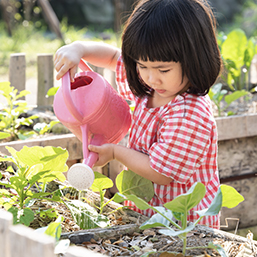
As caregivers, we all want to raise healthy, happy, and independent children who are empathetic, resilient and creative thinkers, all while having the confidence to take on the world.
Sounds easy, right?
Raising independent children means having children who are self-reliant and equipped with essential life skills. It can be difficult to know how much support to provide, what our expectations should be, or how we can create opportunities to increase their skills. Below is a breakdown of different games and activities you can provide your children to promote independence and skill development.
Infants (0-1 years) are at their earliest stages of exploring and learning through cause-and- effect.
During this age range, you want to encourage a variety of physical, social, and play based games to increase their skill set:
Tummy time: This encourages your child to engage in physical development and exploration. Join your child on the floor so there are opportunities for shared joy and playful interactions.
People games: Simple people games like “Peek-a-Boo”, bouncing them on your knee, tickles or rhymes like “Round and Round the Garden,” help develop early social skills.
Visuals or baby sign language: Introducing visuals or basic signs can enhance a child’s communication skills.
Toddlers (1-3 years) are becoming much more capable of understanding their world. They are ever-curious and always watching us to see what we are doing, and how we are doing it.
Simple games: Games like “hide-and-seek, “ Simon says,” or popping bubbles start to encourage problem-solving skills, while being fun and enjoyable.
Self-feeding: Allow them to use utensils and feed themselves. We know it might get messy, but it builds body awareness and helps them to explore new foods and textures.
Building with blocks: When we engage our children in building activities, we are continuing to strengthen their fine motor skills and boosting creative thinking.
Preschoolers (3-5 years) love to help! The more you can allow your child to help, you foster their confidence and give them the opportunity to learn something new.
Dressing themselves: Try offering choices as to what your child wants to wear and teach them to put on and take off clothing. We promise, no one is judging you if your preschooler leaves the house in a tutu and superhero cape! Let their creativity shine!
Help gardening: Engaging in planting and caring for small plants encourages your child to gain a sense of accomplishment.
Simple household jobs: Get them to help you match socks, fold towels, safely chop a cucumber, or wipe the table after a meal. This age group loves to wield a spray bottle, and it sets the stage for them helping out around the house as a part of their routine!
Early school age (6-8 years) find opportunity where they can learn basic decision-making skills. At this age, they are starting to individuate and want to share their ideas and interests with others.
Cooking together: Have nights set aside where the kids help plan and make the meal, or get them involved in the daily meal prep by giving them things to chop, stir, or toss. These kinds of jobs enhance fine motor skills; plus, planning skills and cooking can help picky eaters expand their food repertoire.
Plan outings: Let them participate in planning a family outing. Should we go to the zoo or the park today? This allows children some opportunities for controlled power and autonomy, plus you may learn more about their areas of interest.
Homework: Children may begin to receive homework from school, and this is a great opportunity to establish a routine so they can work towards independent study. If your child does not get homework from school, you can do regular home reading together.
Late school age (9-12 years) children are now able to take on many responsibilities and can independently make choices for themselves. When children start making their own choices, whether positive or negative, they can learn valuable lessons in responsibility and accountability.
Money management: This is a good time to introduce budgeting and provide a small allowance. This allows children to build the skills needed for financial management.
Chores: As children get older, it is important they contribute to the household in a positive way. You can have children pick their own chores, have established ‘chore times’, and find ways to collaborate on bigger household jobs together.
Volunteer together: Finding opportunities to volunteer with your child in their community can be a great way to build a sense of community involvement. You can teach them the value of supporting others outside of their home, as well as help them become more aware of community issues.
Being able to nurture your child’s independence is an important part of development. Through encouragement, guidance, and positive reinforcement, caregivers empower their children to embrace challenges, make informed decisions, and thrive as confident individuals. The journey towards independence is not only about preparing children for the world, but also about instilling in them the belief that they are also capable of taking on any, and all, of life's challenges.
Ashlee and Lisa are child psychologists who created KidsConnect Psychology as a place for children and families to access tools, supports and therapy. Check out our website for digital downloads, parenting tool kits, information about our parent counselling, school consultations, daycare consultations and more! kidsconnectpsychology.com. Follow us on Facebook and Instagram at KidsConnect Psychology.
See our related articles:
Calgary’s Child Magazine © 2024 Calgary’s Child